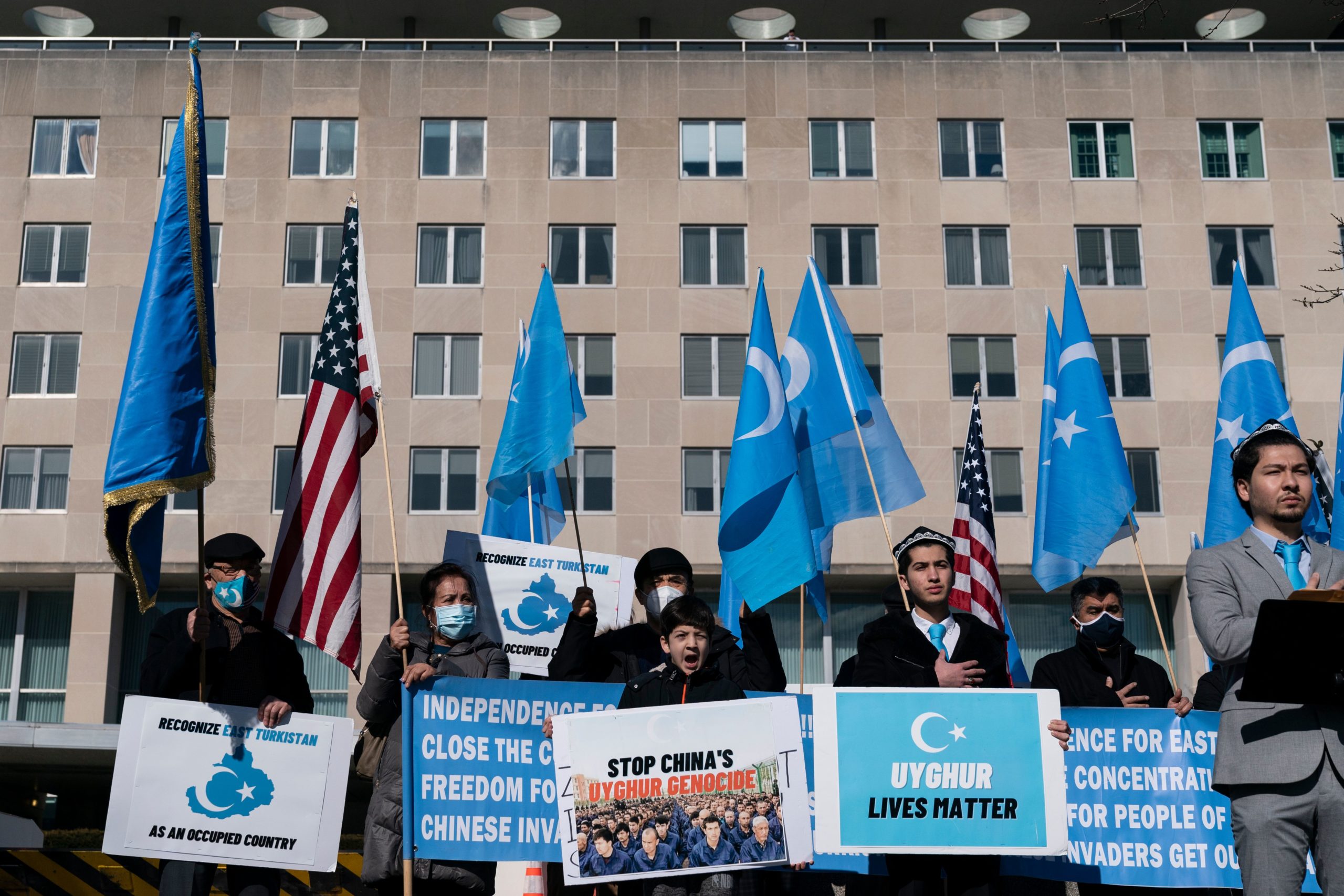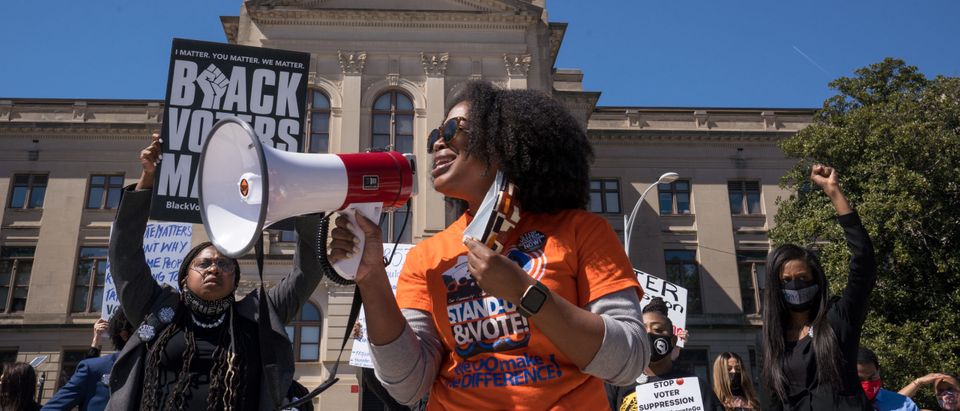U.S. corporations that recently criticized Georgia’s election reform bill have been tied to factories in China with poor conditions for workers and forced Uyghur labor.
Corporate America quickly condemned and chastised Georgia over its recently-passed voting legislation — suggesting the bill “undermin[es]” American democracy, and some going as far as moving business away from the state in response. Additionally, hundreds of corporations, celebrities and executives announced their unified opposition against any “discriminatory legislation” that “prevent[s] any eligible voter from having an equal and fair opportunity to cast a ballot.”
Still, many of these same corporations that have dedicated themselves to the cause of condemning human rights violations are simultaneously connected with factories in China with substandard conditions for workers, limited protections of worker rights, and in some cases, forced labor.
Companies including Amazon and Target appeared on a list in a New York Times advertisement titled “We Stand for Democracy,” which called on Americans to “stand for this most basic and fundamental right of all Americans.”
WE STAND FOR DEMOCRACY — 100s of companies and exec sign this letter opposing “any discriminatory legislation.” Ad appeared in the NYT and @washingtonpost today. w / @andrewrsorkin https://t.co/TSPtxjkWhR pic.twitter.com/bAtS8SyseB
— David Gelles (@dgelles) April 14, 2021
Both Amazon and Target have been linked to suppliers whose factories hire workers under illegal and potentially dangerous circumstances.
In China, schoolchildren were recruited to work overnight at an Amazon supplier, Foxconn, to make Amazon’s Alexa devices, according to leaked documents, first reported by The Guardian. Foxconn also manufactures Apple’s iPhones, and admitted to illegally employing children, according to that same report.
Additionally, an undercover investigator reported “nightmare” working conditions at factories producing toys sold at retailers including Target, according to a report from CNBC. The investigators found a number of violations in the factories that put workers at risk, including the failure to provide workers with necessary safety equipment that would prevent contact with poisonous and potentially carcinogenic chemicals, according to the report.
Other companies on the aforementioned New York Times list, including Abercrombie & Fitch Co., Nike, Cisco and General Motors, reportedly were among over 80 companies found last year to have supply chains linked to Chinese factories using forced Uyghur labor. The State Department maintained that Chinese government authorities are committing “genocide against Uyghurs,” in its annual human rights report released in late March. American corporations have remained largely silent since the term genocide was first applied to the treatment of Uyghurs in an official capacity earlier this year. (RELATED: US Corporations With Big Business In China Stay Silent On Biden’s ‘Genocide’ Designation)

Uyghurs of the East Turkistan National Awakening Movement (ETNAM) hold a rally outside the US State Department calling on US President Joe Biden to increase pressure on the Chinese Communist Party, on February 5, 2021 in Washington, DC. (Photo by ALEX EDELMAN/AFP via Getty Images)
Two companies that condemned the Georgia bill, Apple and Coca-Cola, reportedly pressured Congress last November to “weaken” the Uyghur Forced Labor Prevention Act. This proposed legislation would ban goods manufactured or produced with the aid of forced Uyghur labor in the Xinjiang Uyghur Autonomous Region (XUAR) from entry into the United States. In addition, a more robust vetting system of supply chains would be enacted to ensure corporations avoid those suppliers employing such labor.
The legislation, which aims to create a “rebuttable presumption” that all goods originating from the XUAR are produced with forced labor and thus must be denied entry into the United States, was reintroduced in February.
During the first quarter of 2021, Apple once again lobbied on the anti-slavery bill, along with retail groups including the National Retail Federation, Consumer Technology Association, Retail Industry Leaders Association, American Apparel & Footwear Association and U.S. Chamber of Commerce.
The company previously justified its actions, stating that its lobbying efforts simply sought to “educate policymakers” about aspects of the bill.
One of Apple’s longtime suppliers, Lens Technology, which manufactures glass components for iPhones, was found to rely on Uyghur workers in its factories, according to the Washington Post.
Apple CEO Tim Cook was also criticized in 2019 after the company removed an app that was popular among pro-democracy protesters in Hong Kong, shortly after the Chinese government said it had been used for “illegal behavior.” (RELATED: Apple CEO Blasts Georgia Voting Law, But Has Stayed Silent On Chinese Repression)
Tim Cook also criticized the Georgia election bill.
“The right to vote is fundamental in a democracy. American history is the story of expanding the right to vote to all citizens, and Black people, in particular, have had to march, struggle and even give their lives for more than a century to defend that right,” Cook said.
Coca-Cola was also listed among the corporations to have initially lobbied against the anti-slavery bill last November.
The company did not return the Daily Caller’s request for comment.
“[Coca-Cola] sought to explain that [Coca-Cola] does not import goods from COFCO Tunhe or the Xinjiang Region into the US, and therefore there was no reason to be cited in the Congressional Executive Commission on China’s initial report as it inaccurately characterized [Coca-Cola]’s activity,” the company previously told the Daily Caller in December.
Coca-Cola quickly condemned Georgia’s bill shortly after it was passed. (RELATED: 5 Woke Brands That Are Probably In Your House Right Now)
The CEO of Coca-Cola, James Quincey, called Georgia’s election bill “unacceptable,” after initially facing a boycott for not immediately opposing the new law. “It is a step backwards and it does not promote principles we have stood for in Georgia around broad access to voting, around voter convenience, about ensuring election integrity — this is frankly just a step backwards,” Quincey told CNBC.
None of these companies responded to the Daily Caller’s most recent request for comment on the matter.
The Daily Caller previously reached out to American companies regarding their business interests in China, a country that promised the “eventual demise of capitalism,” and continues its genocidal treatment of Uyghurs.


